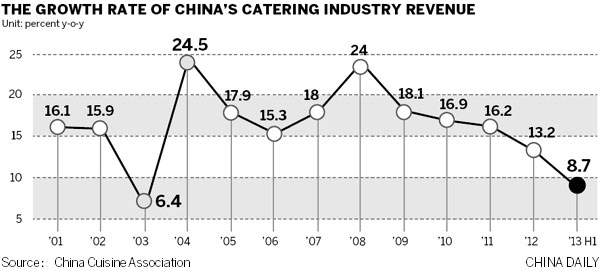Restaurants taste renewed growth amid transformation
Updated: 2013-07-31 07:22
By Wang Zhuoqiong (China Daily)
|
|||||||||||
The growth slowdown in the country's catering industry is over, with double-digit expansion to return in the current half-year, according to the China Cuisine Association.
Growth will hit 10 percent from July to December, with industry revenue of 2.6 trillion yuan ($424 billion), the association said in a report on Monday.
First-half revenue was up 8.7 percent to 1.18 trillion yuan. The growth rate was 4.5 percentage points lower than a year earlier and 4 percentage points below overall retail sales, according to the association.
The recovery will be driven by industry upgrading and transformation, said Bian Jiang, assistant director of the CCA.
Bian said two factors that caused the first-half downturn - the government's austerity campaign and a wave of bird flu cases - won't persist in the second half.
Also, measures to upgrade business adopted by many restaurant companies are likely to take effect in the current half. And with many major holidays due in the coming months, the industry will get a further boost, Bian said.
The government's austerity campaign proved most effective at curbing consumption with public funds in Beijing, where about 2,000 restaurants closed in the first half.
Industry experts noted that many high-end restaurants in Beijing were located adjacent to government departments or institutions and had therefore been hit hardest.
The impact on the catering sector was nationwide, however.
Between January and May, the latest period for which provincial rates are available, the growth rate of most provinces was 10 percentage points lower than a year earlier.
But the growth rates varied dramatically by region. Among first-tier cities, the outcomes for Beijing and Guangzhou were opposite.
In Beijing, a sample of 50 restaurants showed revenue down 6 percent, with 15 high-end catering establishments down 36 percent.
The number of fast food and take-out stores rose, while sit-down restaurants were in decline. Volatile market conditions, high costs and lower profits caused these changes.
Guangzhou, however, was one of the few cities still recording rapid growth. Its catering industry expanded more than 10 percent, with March's growth rate rising to 17.8 percent.
The H7N9 virus (a variant of bird flu) affected the catering industry in Shanghai, Jiangsu and Zhejiang in April. Nonetheless, the industry is recovering slowly. In June, the growth rate of revenue climbed back to 9.5 percent.
The government's move to crack down on luxury spending has resulted in a harsh environment for high-end restaurants.
According to a CCA survey of major restaurant companies in the second quarter, per capita consumption fell 15 to 39 percent at high-end catering places and their revenue slid 22.6 percent.
In the first half, Beijing Xiangeqing Co Ltd closed eight stores, estimating a loss between 160 million yuan and 240 million yuan.
China Quanjude Group, the country's top roast duck restaurant chain, only achieved revenue of 850 million yuan, down 6.5 percent year-on-year, while its profit fell 32.1 percent to 85 million yuan.
Xiao Nan Guo Restaurants Holdings Ltd and Tang Palace (China) Holdings Ltd's interim reports contained warnings that their net profits probably fell.

Related Stories
Global food prices continue to fall 2013-07-30 10:07
Peruvian food proves worthy of the hype 2013-07-27 08:30
Domestic food producers regain customer confidence 2013-07-25 10:17
Street food in Jakarta:noodles 2013-07-25 09:35
Food safety insurance for wedding feasts 2013-07-25 07:19
Today's Top News
Trilateral FTA talks still at exploratory stage
Israelis, Palestinians will meet again soon: Kerry
Apple faces more staff abuse charges
Japan diplomat seeks to mend ties
Beijing and Canberra to resume trade talks
Top leader vows to meet growth target
PBOC repo move to ease concerns
China expected to rise in luxury travel market
Hot Topics
Lunar probe , China growth forecasts, Emission rules get tougher, China seen through 'colored lens', International board,
Editor's Picks

|

|

|

|

|

|





